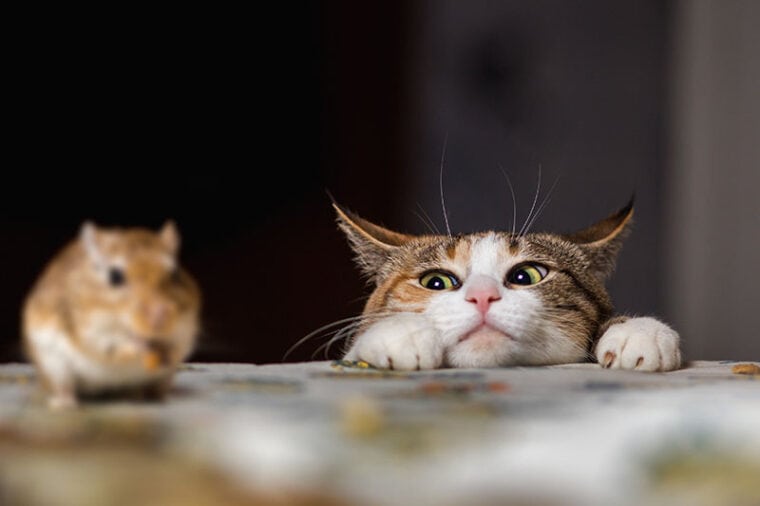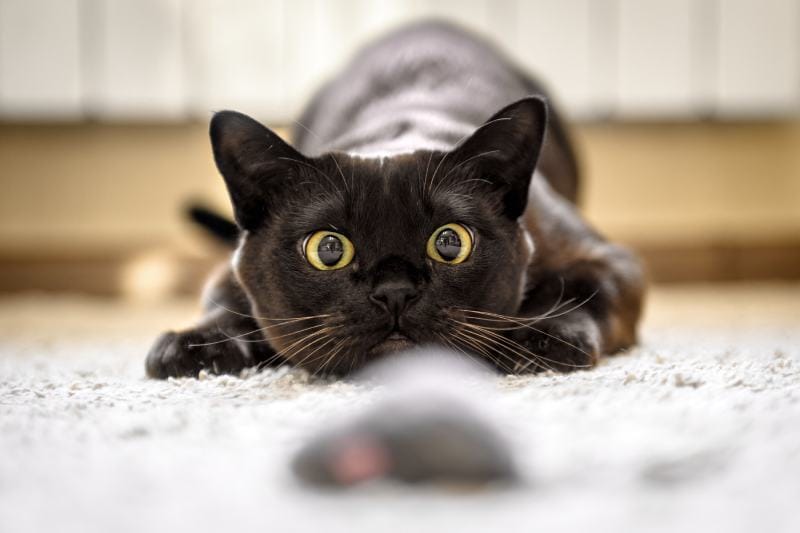
Cats have long been hailed as one of the most effective predators in nature due to their sensitive noses and keen sense of smell. But can cats use their incredible abilities to find and catch mice? Yes, they can! Let’s get into it.
The Science Behind a Cat’s Sense of Smell
It is well-known that cats possess an incredibly powerful sense of smell compared to humans. Cats, like most animals in the wild, rely heavily on their sense of smell for survival. This is because their noses possess around 200 million scent receptors, which is significantly more than a human nose’s 5 million.
The sense of smell of a cat is far superior to that of a human, due to the immense number of scent receptors present in their noses. A cat’s sense of smell can be up to 14 times more powerful than a human’s, allowing them to detect and follow the scent of prey from miles away.
The Ability to Smell Mice
Cats have incredible noses that give them the ability to detect mice and other small animals in their environment. Cats have an excellent sense of smell that allows them to pick up on even the faintest scents, giving them the ability to track down a mouse from long distances or even through walls and other hard, solid surfaces. Furthermore, cats’ whiskers can pick up vibrations and movement near them. Cats can use the information translated through their whiskers to help detect and locate their prey.
How Cats Use Their Sense of Smell to Catch Mice
When hunting mice, cats rely on their incredible capacity for smell. Cats have the ability to detect very subtle scents, allowing them to pick up on the faintest hint of a mouse’s presence. This enables them to track down and zero in on the exact location of a mouse, even if it is hidden away. That’s why you may see your cat pawing at hard surfaces even if there is seemingly nothing there. There could be a mouse (or another critter) behind a wall, for example. The bottom line is that they smell something that humans can’t.

Is it Safe to Keep Barn Cats That Catch Mice?
Eating live mice and living outdoors are both risky, and even dangerous for cats. Eating mice can cause a barn cat to get parasites and other diseases, not to mention other dangers that come with living outdoors in general. If you do keep barn cats, you can help keep them safe and healthy with regular deworming, vaccination, regular flea and tick prevention, regular checkups, and a healthy diet. A healthy diet may encourage your cat to hunt and kill mice, but not to eat them, especially if they’re not hungry.
Why Do Cats Bring Mice to Their Owners?
Cats bring mice to their owners for a variety of reasons. One commonly cited reasons include cats wanting to share their prey with you, believing it is part of your job as an owner to dispose of the mouse, and cats trying to feed you as they would their kitten.
What Is the Best Way to Keep Mice Away from Cats?
The best way to reduce mice in your home is by taking preventative measures, such as sealing all potential entry points for the rodents, eliminating sources of food and water, and regularly cleaning areas where mice may be present. If you have a cat, it can help identify possible mouse activity by recognizing subtle scents or behavior. However, it is important to never intentionally encourage the cat to hunt mice as this can cause psychological distress. Humane traps may be a better solution if you’d like to capture and release any unwelcome rodents.
Other FAQs About Cats, Their Sense of Smell, and Mice
Do Cats Prefer Live or Dead Mice?
Most cats prefer live prey, as they enjoy the chase and hunt more than catching and eating a dead mouse. However, some cats may be content with eating a dead mouse if they are particularly hungry.
Is It Dangerous for Cats to Eat Mice?
Yes, it is possible for cats to get sick from eating mice. Cats should be fed a diet of high-quality cat food and should never be allowed to eat mice as they may contain parasites or toxins that can make them ill.

How Long Can a Cat Follow a Scent Trail?
Cats are able to follow a scent trail for many miles, as long as the scent remains strong and consistent. They can also detect faint scents from far away and will track them until they find what they’re looking for.
Do Cats Enjoy Hunting?
Yes, cats enjoy hunting because it gives them an opportunity to act on their instinctual needs. Hunting also provides cats with mental stimulation and exercise, which can help alleviate boredom and anxiety.
Is Hunting Instinctive For Cats?
Yes, hunting is a natural instinct that cats possess from birth. While some cats may never hunt in their lifetime, the instinct remains with them and can be triggered in certain situations.
What Are Some Signs That a Cat Is Hunting?
There are several signs that a cat is hunting, such as crouching low to the ground, stalking silently, and sniffing around for scents. Cats may also arch their backs and flick their tails when they’re on the prowl.
Can Cats Smell Better Than Dogs?
No, dogs have a better sense of smell than cats. This is because dogs possess more scent receptors in their noses, giving them the ability to detect odors at much lower concentrations than cats. However recent research has suggested that cats may be better than dogs at discerning between different smells.
Conclusion
The answer to whether cats can smell mice is a resounding “yes”! Cats have an incredibly powerful sense of smell that helps them locate and capture their prey. Their noses possess millions of scent receptors. This incredible sense of smell combined with their agility and hunting skills makes cats one of nature’s most effective hunters!
Featured Image Credit: Sergey Zaykov, Shutterstock








